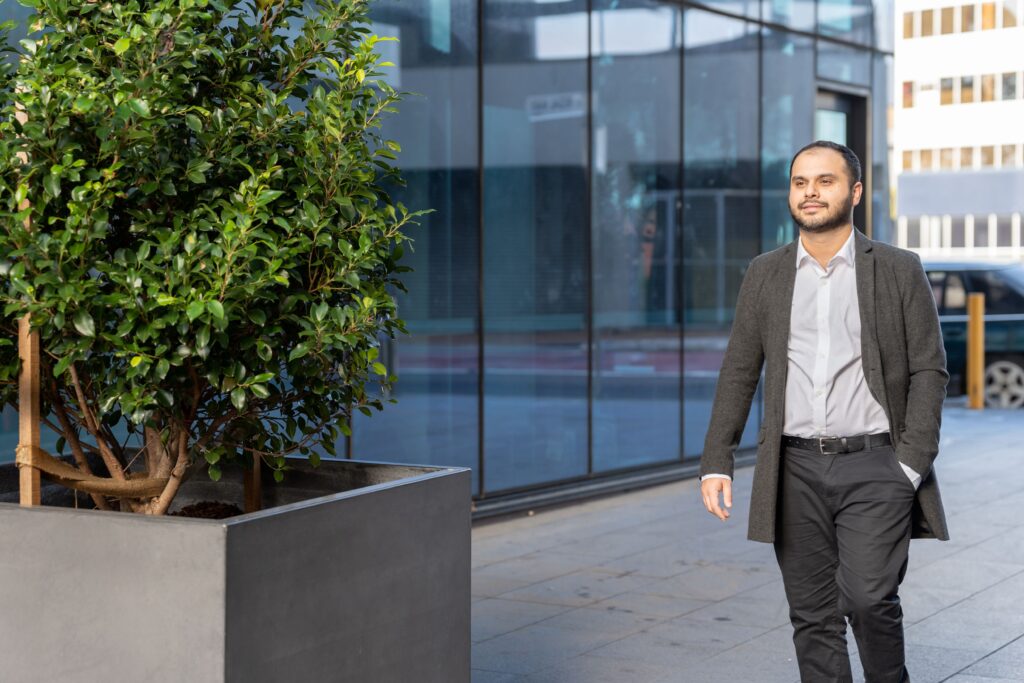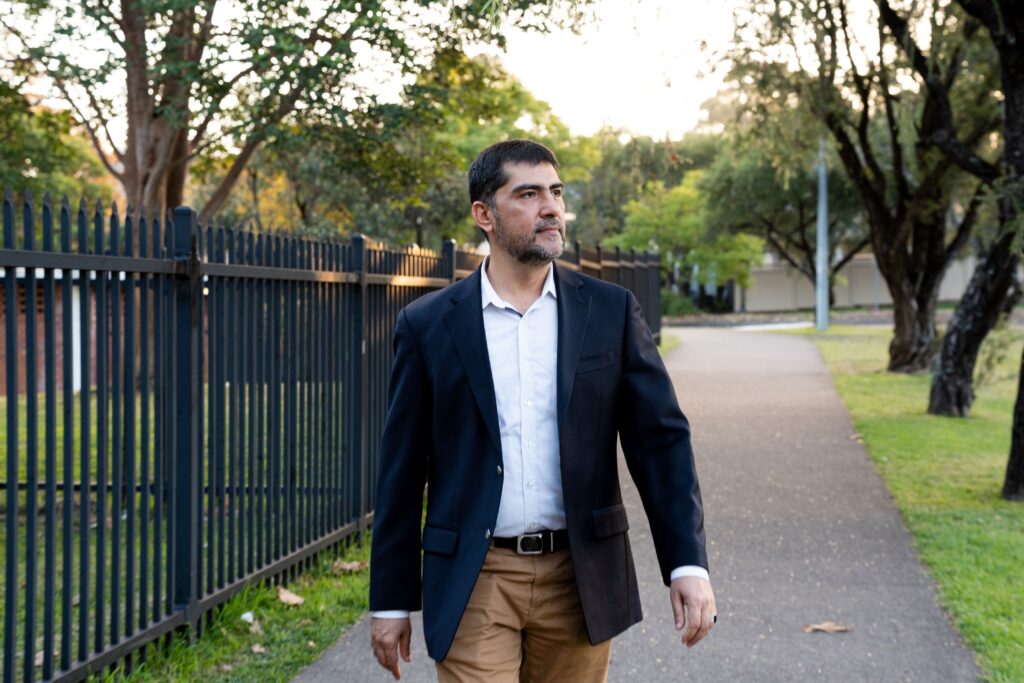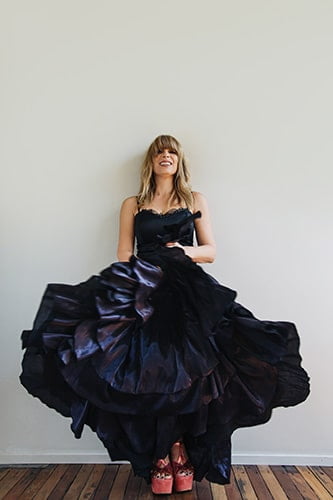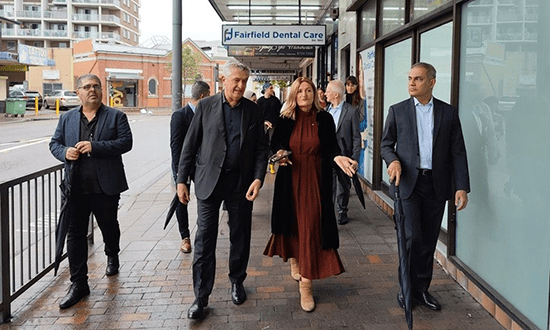Before being compelled to leave his homeland in search of asylum, Iranian-born Mohsen had successfully attained a Bachelor’s degree in biomedical engineering, specialising in prosthetics and orthodontics. Throughout his studies, he worked in the banking sector, an experience that unexpectedly sparked his interest in finance.
Despite his education in the medical field and experience in finance, Mohsen faced challenges in securing employment in either sector.
“I applied for so many jobs all over Sydney, but no one would give me a chance,” he said.

Mohsen still has all 37 employment rejection letters sitting in his email inbox. He looks at them from time to time for motivation.
“I faced a disheartening pattern of consistent rejection, with doors being slammed shut in my face despite all efforts,” he reflected.
Mohsen’s limited proficiency in English proved to be a major challenge in obtaining work. Due to being on a temporary bridging visa, he couldn’t initially access English courses. But he remained determined in his conviction, that ‘no one can stop [him] from learning’.
Mohsen, set to overcome his obstacles, employed resourceful methods to continue his learning. He enrolled to study at the Sydney Bible College and tried to follow along in English. He also made the most out of YouTube to enhance his skills.
Mohsen’s language proficiency not only affected his job prospects but also his confidence.
“It’s easy for people to understand that language barriers are hard, but they don’t understand how it feels to experience it… My confidence plunged to its lowest depths,” he said.
“When you only know a mere ten words of English, anxiety takes hold, leaving you unable to recall even those few words during job interviews,” Mohsen recalled.
Upon obtaining the permissions through his visa, Mohsen enrolled in SSI’s Refugee Employment Support Program (RESP) and participated in work readiness workshops, gaining insights into the local job market, establishing networks, and connecting with mentors. He enrolled in English courses at TAFE and decided to study a Bachelor of Business, majoring in Applied Finance through a scholarship.
In 2022, Mohsen successfully found a job opportunity with the ANZ bank, a transformative stepping stone into the financial industry for him.
As Mohsen contemplated his career journey, he consistently emphasised the importance of learning opportunities. If he could say anything to himself ten years ago it would be to ‘learn, learn, and keep learning’.
Unfortunately, Mohsen’s temporary protection visa imposed further limitations, which hindered his prospects for ongoing employment at ANZ.
Yet, demonstrating resilience once again, Mohsen leveraged his financial knowledge to establish his own successful business, In2mortgages, as an independent mortgage broker.
Reflecting on his journey, Mohsen wanted to remind employers of the potential of empowering refugees, “Whilst it is unfortunate that they have had to leave their home countries, it presents a unique opportunity for employers in Australia.”
“Diversity brings opportunities to employers. They are fortunate to have access to this pool of diverse and talented people who can bring unique perspectives into their workplaces,” he said.
“At the end of the day, we [refugees] are going to open our own business, just like I have done. It is the employers who are missing out on seizing the opportunities that come with hiring us.”
But despite an impressive 15-year career in medicine, experience leading Afghanistan’s first HIV treatment centre, and a Master of Public Health at James Cook University, Mohammad faced an upward battle to find employment in the Australian medical sector.
Instead, with the support of the Refugee Employment Support Program (RESP), he has embarked on a new career path with Transport NSW, while undertaking the lengthy process of getting his overseas qualifications recognised.
“I eventually want to get back into the medical field. RESP helped me to get recognition of the documents and has also offered to support me with the fees for the AMC exam.”
While Mohammad works towards an Australian medical license, he collaborated with RESP to overcome some of the additional barriers refugees often face in finding employment in Australia. This includes gaining an understanding of local recruitment practices and work culture, building a network, and gaining practical skills and qualifications, such as an Australian driver’s licence.
“Most of the jobs when I was applying required me to have an Australian driver’s licence. So, RESP also supported me to get some classes, doing my learner’s test and getting my full licence.”
In July 2022, after seven months in Australia, Mohammad gained a Humanitarian Cadet position at Transport NSW. Mohammad excelled in his role with the Infrastructure and Place division and has since gained both a promotion and a permanent position in the team.
“In the beginning, it was a bit challenging but each day I learn new things and skills, so I just go with it. I am defiantly enjoying the role because I always enjoy challenges. Easy jobs can be done any time, but the good thing is I really enjoy challenging work like this,” Mohammad said.

“Importantly, my role with Transport NSW allows me to work from both home and the office, which has enabled me to encourage and support my wife to complete her studies as I have extra time to look after our kids and family.”
While Mohammad is making meaningful contributions to Transport NSW and enjoying his work, he remains determined to utilise his medical skills and experience to positively impact people’s lives in Australia.
“I have aspirations to get back into the medical field but first I have to get some background in Australia and working with government,” Mohammad says.
When Iranian-born Mary Logan sought refuge in Australia, she hoped to continue her work in hair and beauty. However, her overseas experience and qualifications were not recognised, forcing the salon owner and manager to begin again as an apprentice.
(more…)Reconciliation Australia has compiled a list of practical steps we can all take to create change. Click here for information on how you can be a voice for listening, unity, fairness and more.
At SSI, we’re on a journey of reconciliation to ensure we are doing everything within our power to contribute towards realising makarrata – a Yolngu word that means coming together after a conflict.
SSI’s Reconciliation Action Plan has mechanisms for improving our practices, ways of working and engaging with First Nations staff, clients and communities in which we operate.
These have ranged from building more effective community relationships to implementing practices within programs that incorporate lessons on First Nations history and rituals, to taking a public position acknowledging the dual nature of January 26.
We are almost at the two year mark and will soon prepare for a review with Reconciliation Australia, before developing our next two year RAP. We continue to learn valuable lessons the deeper we dive into our actions.
We have learnt that engaging and building relationships with First Nations people – be it staff or external communities, takes much time and many, many cups of tea. In Queensland, for example, our staff have made considerable efforts the last couple of years to consult with and develop a relationship with community elders in one region, working to listen, understand and immerse themselves into community, before creating a dialogue. These efforts are ongoing and the team learn more and more about the community, through each engagement opportunity.
At SSI, there is a genuine appetite and desire to support the RAP and reconciliation efforts across the business. Staff have come forward to contribute in many different forms.
Just recently, we formed a Voice to Parliament working group that was initiated by two staff members. This initiative has grown legs and will see SSI out in CALD communities, conducting forums aimed at educating and assisting people to make an informed decisions when it comes time to vote at the referendum.
There are many different ways to progress reconciliation. Whatever path you chose, I encourage you to take some time this week to reflect on steps you can take to realise makarrata.
For more information, visit the Reconciliation Week website, or click here to read SSI’s RAP.
By the end of 2023, the Australian government will hold a referendum to ask Australians if there should be an Aboriginal and Torres Strait Islander Voice enshrined in the constitution – a proposal from the Uluru Statement from the Heart, to which SSI is a signatory.
Today, as an organisation, SSI is formally announcing its support for the upcoming referendum by publishing a position statement, approved by the board, in which we fully endorse the Voice to Parliament as a historic opportunity to move our country forward.
As a leading settlement organisation, we welcome newcomers to a place where First Nations people have had a continuous connection to the land for more than 65,000 years, having a rich culture, wisdom and care for the land that has not always been acknowledged or respected, including in Australia’s 122-year-old Constitution. We have an opportunity to change this.
We believe the establishment of a Voice to Parliament presents an opportunity for us to walk with First Nations people, side-by-side, and take a step forward on our journey towards achieving makarrata – a Yolngu word that means coming together after a conflict.
Constitutional recognition through a Voice is a simple but powerful proposal whose time has come. Aboriginal and Torres Strait Islander communities have great strength and wisdom. These are attributes that must be harnessed in order to meaningfully address the inequality they face and work together to achieve a shared vision of a fairer future for all Australians.
The reality is that even with the best intentions, governments and parliamentarians alone cannot provide lasting solutions without working with First Nations community leaders. A Voice to Parliament would simply ensure that Aboriginal and Torres Strait Islander people are able to advise politicians about what really works in their communities before decisions are made.
We recognise that a Voice to Parliament does not present an instant fix for the many and varied issues of inequality facing First Nations communities. Much more needs to be done to realise makarrata – but this is an important practical first step.
The world is changing, and Australia’s migration system and humanitarian program need to change with it.
Our proposals acknowledge that the global demand for skills has intensified.
- To strengthen Australia’s position as a destination of choice, SSI proposes the four-year waiting period for income support is waved or reduced to six months for all new permanent residents. The existing waiting period denies new residents support, even when they have already made a significant social and economic contribution to Australia. Waving the waiting period will help attract skilled individuals and promote a fairer country.
- Additionally, SSI proposes the visa processing fee for skilled migration pathways is reduced or abolished for humanitarian entrants, especially for those with in-demand skills. The prohibitively high costs associated with alternative migration pathways is one of several systematic barriers that prevent refugees from migrating for employment, educational or reunification purposes. Supporting skilled pathways for refugees through a fee visa waiver would also help address Australia’s critical skills shortages.
- Another avenue for addressing skills shortages and humanitarian need is to increase the quota or expand the pilot for skilled migration pathways for humanitarian entrants. The limited number of Refugee and Humanitarian Visas available means that skilled refugees often miss out on protection in Australia. SSI proposes that increasing the quota or expanding the pilot for skilled migration pathways for humanitarian entrants would create an alternative and complementary pathway to protection while enabling skilled refugees to contribute to Australia’s economy.
- Importantly, SSI also proposes to increase Australia’s humanitarian intake from 13,750 places to 27,000 places. This is consistent with the government’s policy commitment, and SSI urges that it should be implemented as soon as possible. Increasing Australia’s humanitarian intake from 13,750 places to 27,000 places would reflect the changing global environment and Australia’s commitment to humanitarian values.
- Finally, with Australia’s migration and humanitarian programs expanding, the country is set to welcome approximately one million people over the next five years. Ensuring newcomers feel connected, engaged, supported, safe and settled is key to reaping the many benefits of migration, and settlement services are fundamental to achieving this. That is why we also recommend the government better resource settlement service organisations, especially at a time of rising service delivery costs.
SSI’s nine proposals for migration and humanitarian reform, including those listed above, aim to strengthen Australia’s position as a destination of choice, improve its reputation as a fair country, and enable skilled refugees to contribute to Australia’s economy.
Read SSI’s full policy submission: https://lnkd.in/ghxM6XEG
“Our delegation was made of women of all ages, cultural backgrounds, and disciplines of music. But we had one thing in common: we are passionate about what we do and we’ve all have been fighting to do it,” Marina said.
“Every other woman had been going through the same struggles, we’ve been fighting to come out with our voices. The delegation was not about competition, it was about sisterhood. We are still in touch to this day.”
Marina was part of a ground-breaking initiative where SSI, BEMAC and AWMA joined forces to invite female artists from diverse backgrounds across NSW and Queensland to take part in a carefully curated program. The program included workshops and industry talks, and culminated in attendance at the AWMA ceremony and concert.
As the applications open today to form this year’s delegation, Marina encouraged emerging artists to apply.
“I would tell all female musicians from all ages and cultural backgrounds that just by applying you are supporting all of us,” she said.
“Apply and if you get chosen that’s a gift. You will connect with a wonderful family of women supporting each other. You will connect with people who understand your journey and struggles. It’s an experience I find hard to put into words because it’s profound on so many levels.”
The aim of the delegation is to promote diversity and equality in the Australian music industry by empowering diverse emerging artists to develop their artistic practice, connect with each other, and network with Australia’s most established female musicians.
 Marina noted that although she has sometimes felt alone as a musician from a diverse background, the experience left her feeling a renewed sense of empowerment, ready to build her next show that is ‘all about women’.
Marina noted that although she has sometimes felt alone as a musician from a diverse background, the experience left her feeling a renewed sense of empowerment, ready to build her next show that is ‘all about women’.
“I come from a Croatian background, I grew up in New Zealand, then migrated to Australia, then the UK, and Italy. In each of these places, I learned about their customs and language. My whole life has been adapting to different cultures and listening to different languages, trying to fit in,” Marina said.
“Being part of the delegation and AWMA gave me an opportunity to be acknowledged by representing myself and women like me by being a delegate. It was also empowering for younger women to see an older female artist being showcased and uplifted in this way.”
“Women like us, diverse women from every background, shouldn’t be invisible.”
How to apply
Applications to be part of the next delegation are now open and close at midnight on 2 June. We welcome applications from emerging, female-identifying, or non-binary artists from diverse cultural backgrounds in NSW and Queensland.
The world we live in today has greater connection between countries, cultures, and economies than our parents or grandparents could have ever imagined. This has led to greater mobility, but so too has it created disruptive migration trends such as the record levels of forced displacement due to conflicts and persecution.

Refugee resettlement providers must not only focus on providing essential services to refugees but also prioritise engaging in international dialogue and participating in forums that bring together organisations from around the world to share knowledge, experiences and best practices, as well as to advocate for the rights of refugees globally.
SSI is a regular participant at forums, such as the UNHR NGO Consultations, so it was a great honour last month to be able to play our part locally in hosting UN High Commissioner for Refugees, Filippo Grandi, on his trip to Australia.
During a visit to SSI’s new Fairfield office, we had the opportunity to elevate the experience of people who come to Australia as refugees, opening the door to a greater understanding of settlement in Australia and the experiences of those who come to our shores seeking safety.
The following week, our Fairfield office was once again honoured to play host to our international colleagues, this time holding a forum for Amnesty International Secretary General Dr. Agnes Callamard to hear from people with lived experience.
Whether working internationally or on a local level, SSI places a big emphasis on ensuring our work is both driven and informed by people with lived experience
We employ over 1,000 staff – more than half of whom were born outside of Australia. Many of these staff also have experiences of forced displacement, and it was wonderful to add their voices to the forum, sharing their nuanced experiences as people who have both been refugees and now support refugees.
SSI delivers local services, but we are committed to contributing to the sector globally through policy, advocacy, capacity building and the development of strong partnerships internationally.
Last week, I was privileged to speak at the Metropolis International Seminar at Georgetown University in Washington about the evolution of migration in the post-pandemic world and the lasting legal, political, and social implications of “temporariness” in all its forms.
It was fascinating to share insights of SSI’s experience in this area, while also hearing from other countries – and particularly relevant given last week’s announcement from the Federal Government on a big shift towards a more permanent-focused migration program in Australia.
As I absorbed information over the two-day seminar, it struck me again the value of collaboration between those of us in the migration space – whether refugees or others – to share resources, knowledge and expertise.
Through collaboration with international bodies such as Amnesty International, we have advocated to bring innovative initiatives to Australia, such as the Community Sponsorship Program.
Working with our international colleagues at the UNHCR NGO Consultations, we have identified challenges and barriers that refugees face in their new host countries. We have been able to advocate for better policies and support, and share experiences and best practices to improve resettlement outcomes for refugees.
Refugee issues are not limited to one country or region – they are a global concern – and require all of us to work collaboratively to shift the dial.
When Waseemunnisa Syed was invited to an SSI organised Community Voice consultation session for Urdu speaking people, she was initially reluctant.
(more…)Many young adults struggle to define their career aspirations and educational goals, but Ellen Brant has found guidance and support in a new pilot program by SSI’s Local Area Coordination (LAC) program.
(more…)